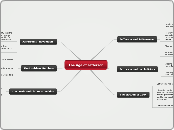The Age of Jefferson
Jefferson and Jeffersonian
He did not believe that blacks and whites could live permanently side by side in American society.
He worried that high taxes, standing armies, and public corruption could destroy American liberty by turning government into the master rather than serving of the people.
Also believed that popular liberty required popular virtue
Jefferson regarded cities as breeding grounds for mobs and as menaces to liberty.
Jefferson and the Judiciary
Adams appointed the "midnight judges," making the courts more Federalist than Democratic-Republican.
Marbury vs. Madison (1803): the judge ruled that Madison should have ruled Marbury's commission.
The Election of 1804
Jefferson's main threat was Aaron Burr
The adoption in 1804 of the 12th Amendment, which required separate and distinct ballots in the electoral college for the presidential and vice presidential candidates, put an end to the possibility of an electoral tie for the chief executive.
Jefferson won election
Jefferson's "Revolution"
Jefferson sought to restore the librrty and tranquility that the United Sates had enjoyed in its early years and to reverse the drift towards despotism that he had seen in Hamilton's economic program and John Adam's Alien and Sedition Acts.
He induced Congress to repeal many taxes, and they slashed expenditures by closing some embassies overseas and reducing the army.
The Louisiana Purchase
He purchased the territory for 15 million dollars from France (3 cents per acre).
Ended European expansion in America
Federalists were against it because they feared it would take away from New England trade.
The Lewis and Clarke Expedition
Jefferson had planned this exploratory expedition, and he picked fellow Virginian Merywether Louis and William Clarke
The group reached the Pacific Ocean in November 1805 and then returned to St. Louis
